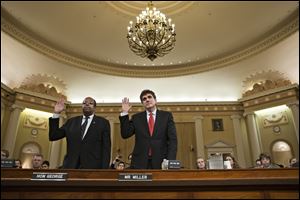
Shaking up the IRS
5/21/2013
Ousted IRS chief Steven Miller is sworn in on Capitol Hill last week prior to testifying before the House Ways and Means Committee.
Daniel Werfel, whom President Obama has tapped to lead the Internal Revenue Service, has a record of shaking up stolid federal bureaucracies. When he gets to the IRS, he shouldn’t hold back.
If a new Treasury Department inspector general’s report and a House hearing are any indication, the IRS doesn’t just need a shake-up — it requires a veritable earthquake of reform. That’s clear enough even though there are still plenty of unanswered questions for the various investigations that are under way.
The origins of the IRS’ practice of targeting Tea Party-type groups applying for 501(c)(4) tax-exempt status are still murky. Steven Miller, the outgoing acting IRS commissioner, testified last week that he couldn’t identify whose idea this was — though so far there is no evidence that it came from Washington.
As for motivations, IRS officials have insisted that the agency saw a big influx of applications beginning in 2010, and that its targeting was just an inappropriate shortcut to sort through them. Yet an IRS letter to the inspector general also cited pressure from “the public, media, watchdog groups, and members of Congress” to investigate specific 501(c)(4) groups as a factor in its decision making.
Does that mean political pressure might also have influenced IRS staff? Regardless of the origins of the policy, the result for conservative organizations was a hellishly long application process — months, even years.
Some were lucky enough only to have to wait. Others had to answer invasive and unnecessary questions about the political affiliations of officers or the activities of those in event audiences. It’s not surprising that since 2009, many more groups with “progressive” in their titles obtained nonprofit status than those with “Tea Party” in their names.
At seemingly every level in the IRS, leadership failed. After senior managers found out about the targeting, why didn’t they demand that any more changes to the criteria used to sort out applications required their approval? Instead, lower-level staffers were able to revert to targeting after they had been told to stop.
Why didn’t IRS specialists get training on the nature of nonprofit social welfare organizations until May, 2012? After that training, the pace of application reviews shot up, suggesting that the IRS “specialists” had been clueless about what the Internal Revenue Code allows.
It’s good that Mr. Obama sacked Mr. Miller. Some have expressed sympathy for the outgoing chief; we see little reason for it. It’s also welcome that the President is promising to hold more people than Mr. Miller to account.
Among the many investigations that are getting started, the Justice Department is beginning a criminal probe. More important than criminal convictions, however, is that investigators in the Obama Administration and in Congress get answers, that the IRS sees genuine reform, and that those who betrayed the public trust — willingly or not — are removed from positions in which they could repeat their errors.
— Washington Post